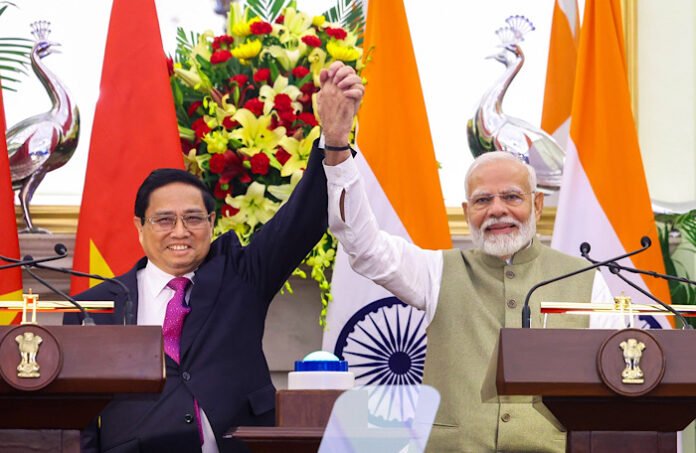New Delhi: Indian Prime Minister Narendra Modi and Vietnamese Prime Minister Pham Minh Chinh have reinforced their commitment to regional stability in the South China Sea during a high-profile meeting in New Delhi, addressing rising concerns over Chinese assertiveness.
In their joint announcement, both leaders emphasized the need for “non-militarisation and self-restraint” to avoid worsening disputes in the strategically crucial South China Sea. They reaffirmed their commitment to resolving maritime conflicts in line with the 1982 United Nations Convention on the Law of the Sea (UNCLOS).
Modi, while addressing the media, highlighted India’s position on supporting “development, not expansionism,” a clear allusion to China’s increasing influence in the Indo-Pacific region. He stressed the importance of preserving freedom of navigation and overflight in a region crucial to global trade.
As part of strengthening their bilateral relationship, Modi and Chinh revealed a new initiative to enhance their Comprehensive Strategic Partnership. This includes a $300-million credit line aimed at enhancing Vietnam’s maritime security. They also agreed to increase cooperation in counter-terrorism and cyber security.
The leaders’ joint statement emphasized the importance of maintaining peace, security, and stability in the South China Sea, while resolving disputes through peaceful means and respecting international law. They called for adherence to UNCLOS principles to manage maritime rights and disputes, and urged all parties to avoid actions that could escalate tensions.



Hope we get international news on a regular basis .Because this benefit alot to those people who are preparing for competitive exam.Waiting for the update.
Thank you
What is 1982 United Nations Convention on the Law of the Sea (UNCLOS).
The 1982 United Nations Convention on the Law of the Sea (UNCLOS) is an international treaty that establishes a legal framework for all marine and maritime activities. Key points of UNCLOS include:
1. Territorial Sea: Coastal states have sovereignty up to 12 nautical miles from their coastlines.
2. Exclusive Economic Zone (EEZ): Coastal states have rights to explore and use marine resources up to 200 nautical miles from their shores.
3. Continental Shelf: Coastal states can claim rights to the continental shelf beyond the EEZ up to 350 nautical miles, depending on geological criteria.
4. High Seas: Areas beyond national jurisdiction, where freedom of navigation and fishing are recognized.
5. Dispute Resolution: Establishes mechanisms for settling disputes between states regarding maritime boundaries and interpretation of the convention.
6. Environmental Protection: Sets guidelines for the protection and preservation of the marine environment.
7.Marine Resources: Regulates the extraction and management of marine natural resources.
UNCLOS is considered the “constitution for the oceans,” providing a comprehensive legal framework for governing the world’s seas and oceans.
Finally new from my holiday destination Vietnam.
Diplomatic ties are good but the way he treat his own people its pathetic